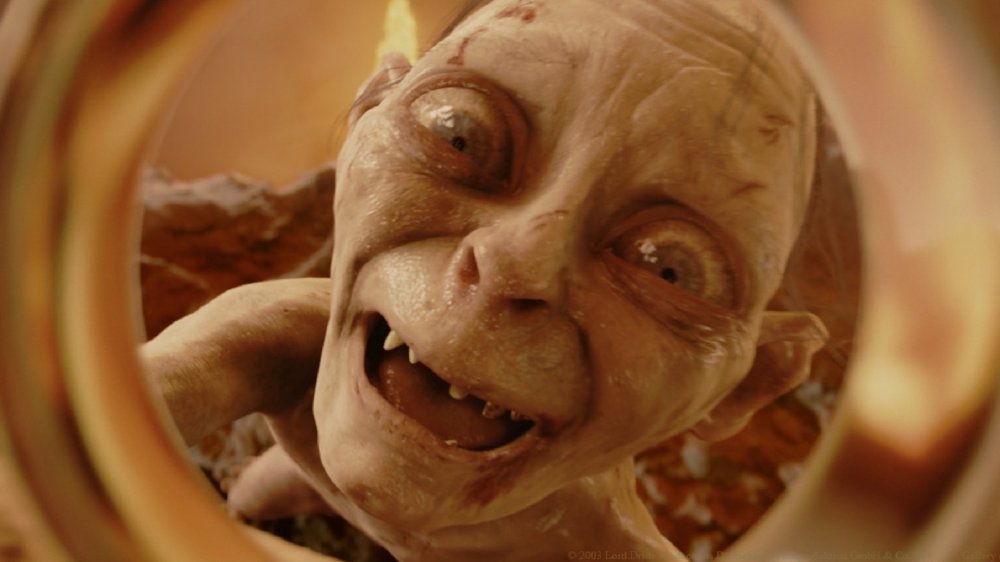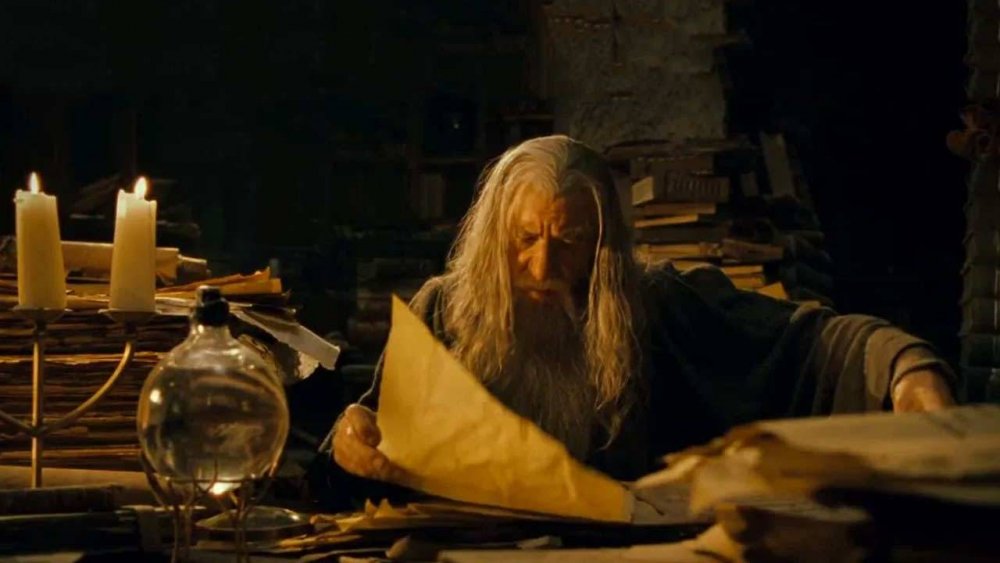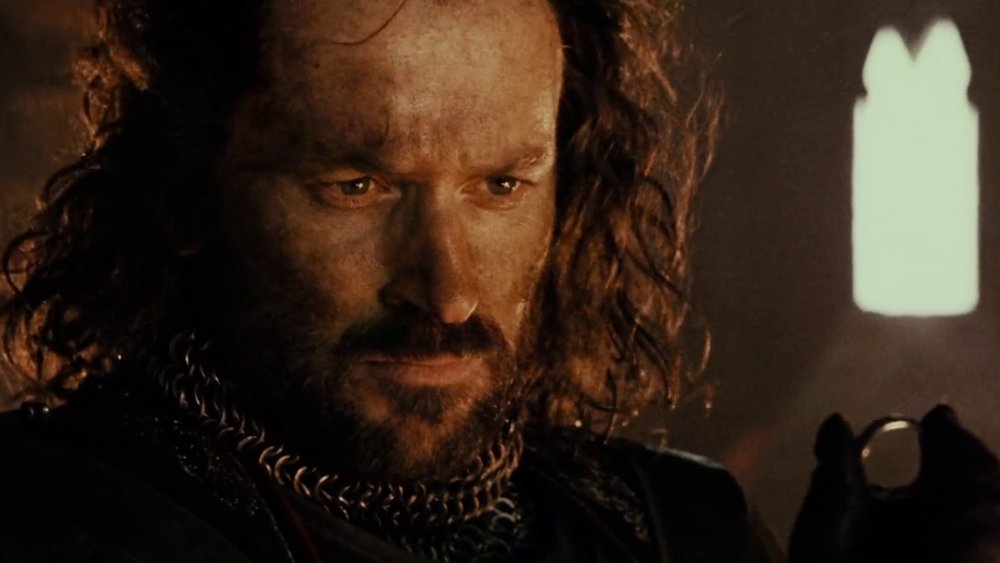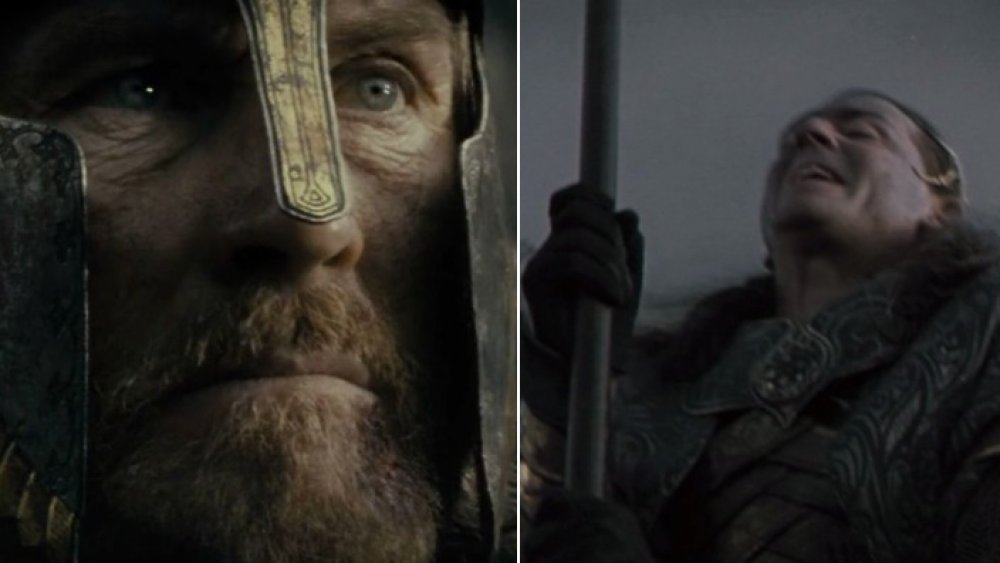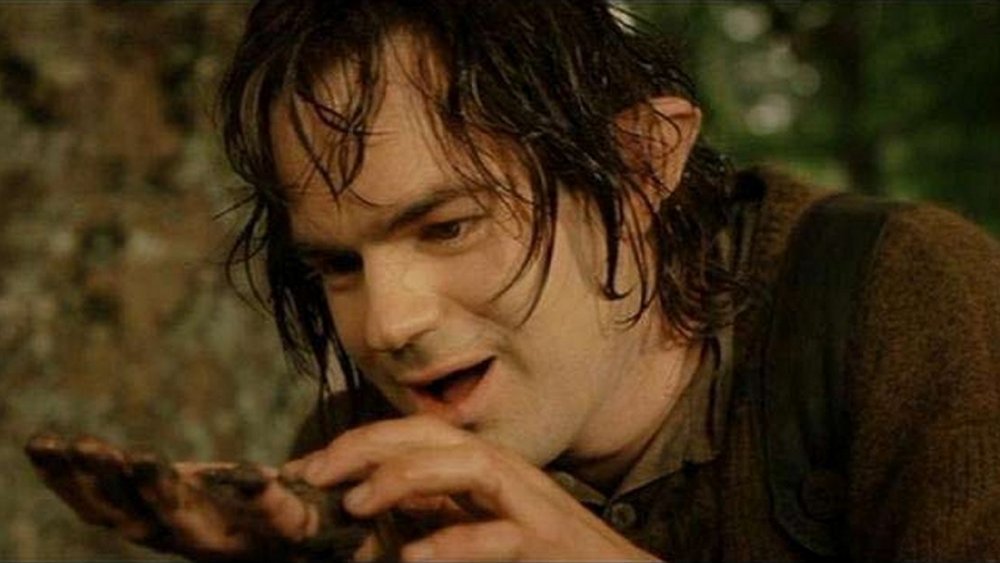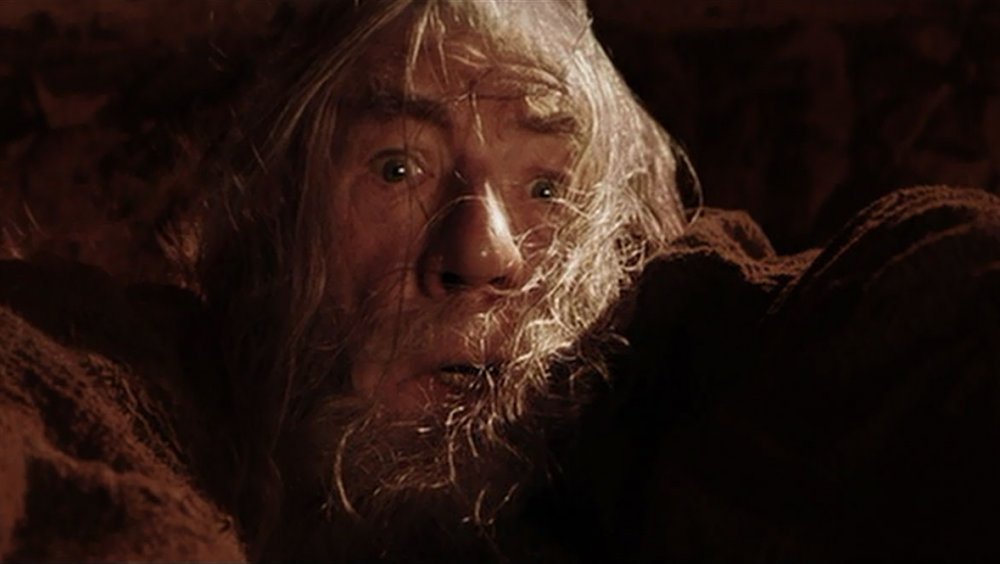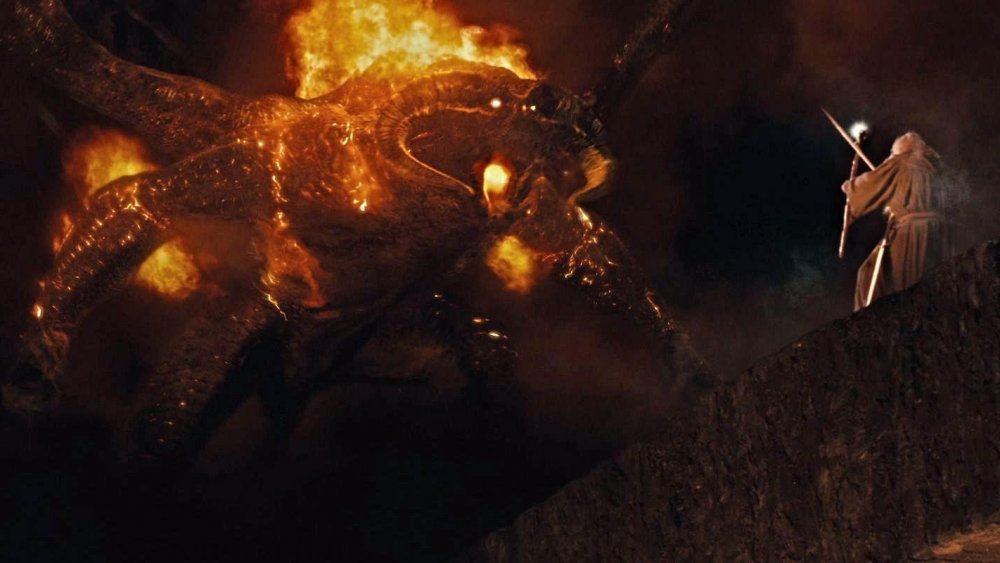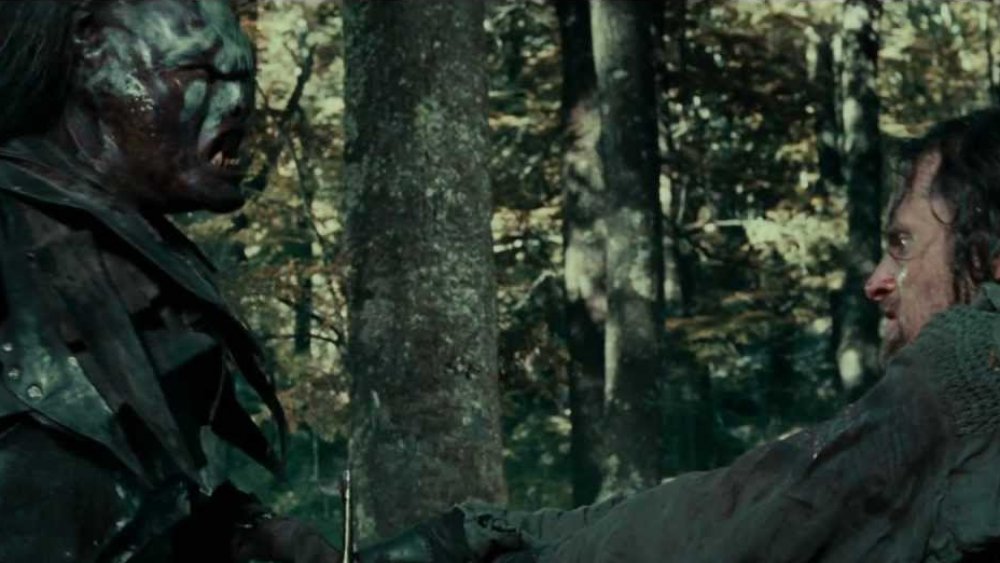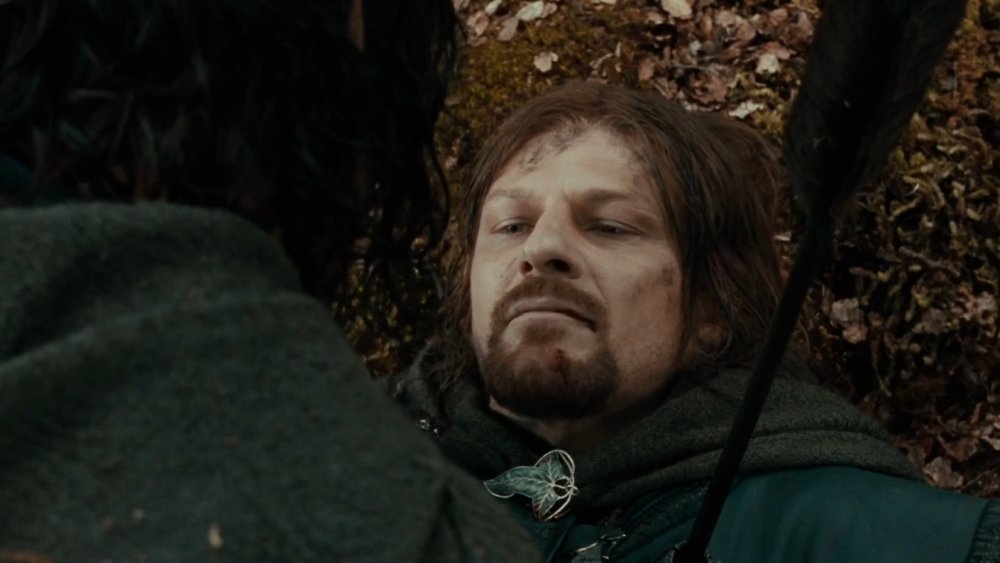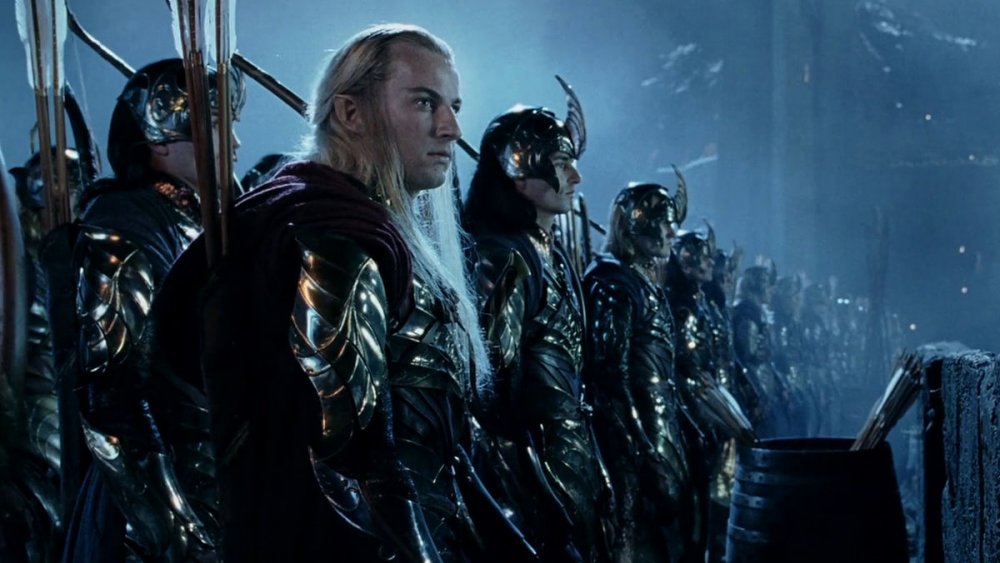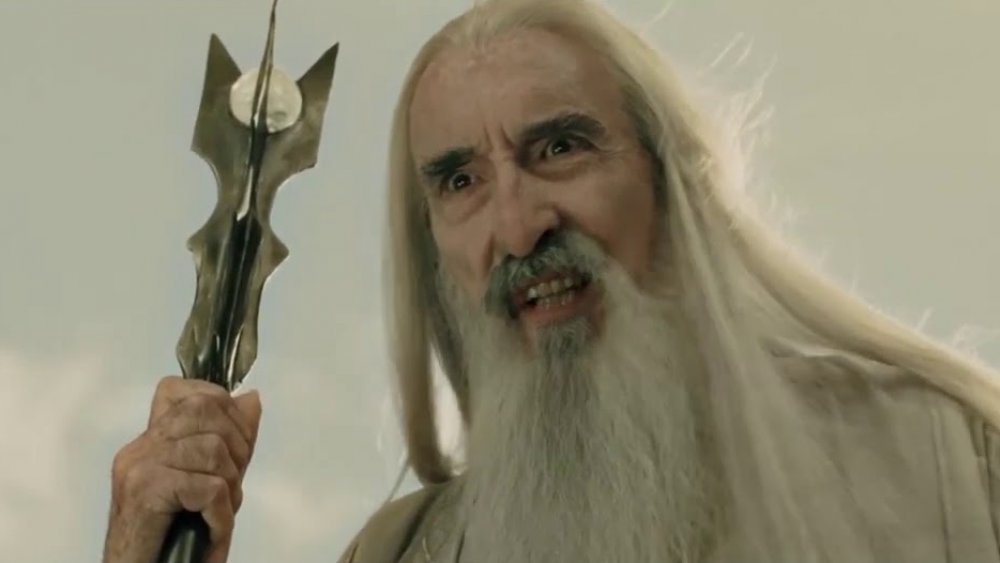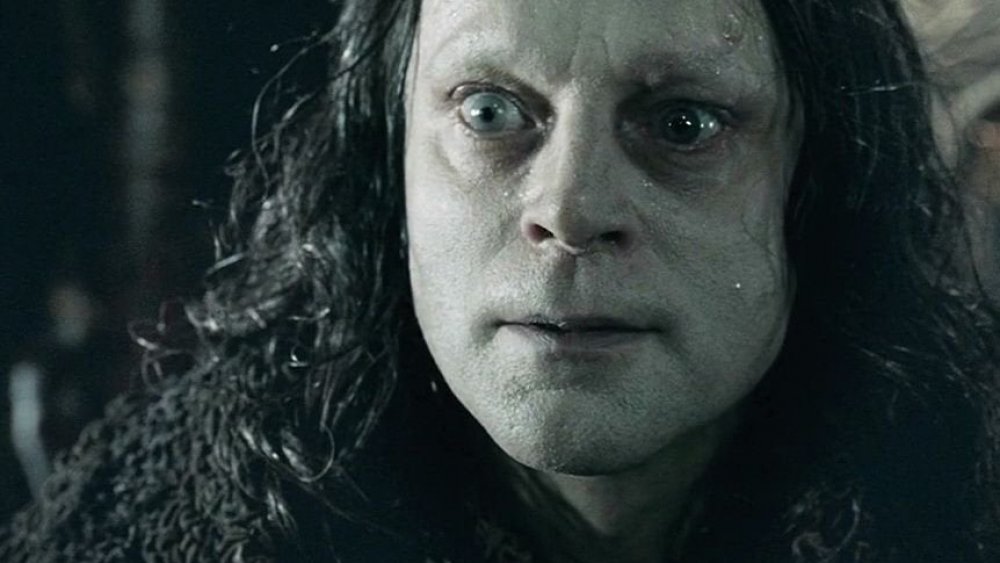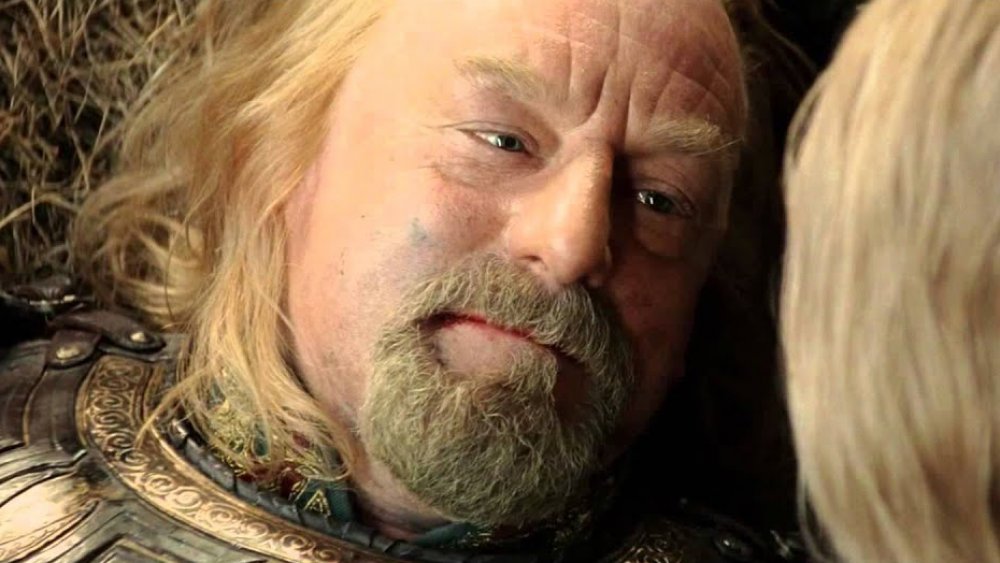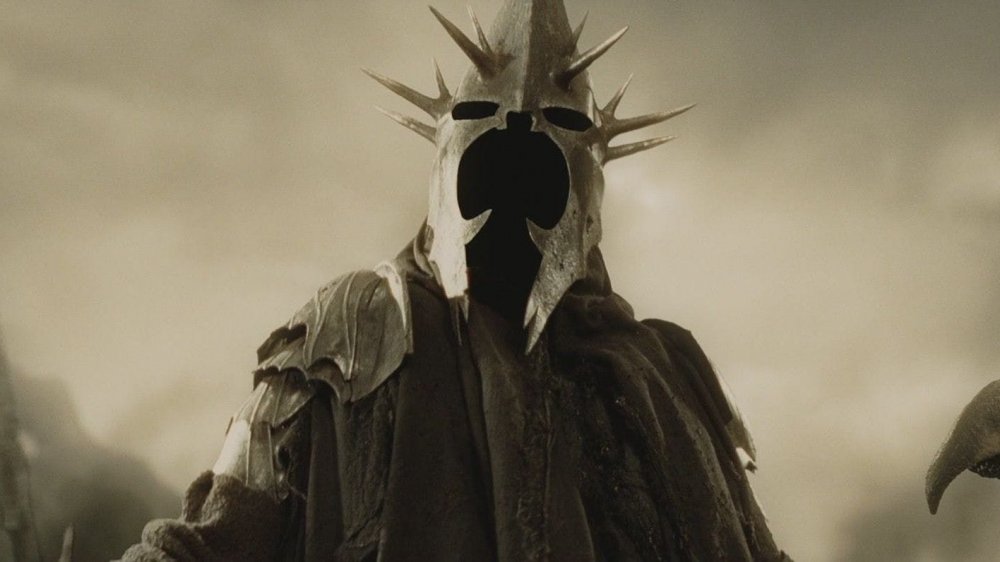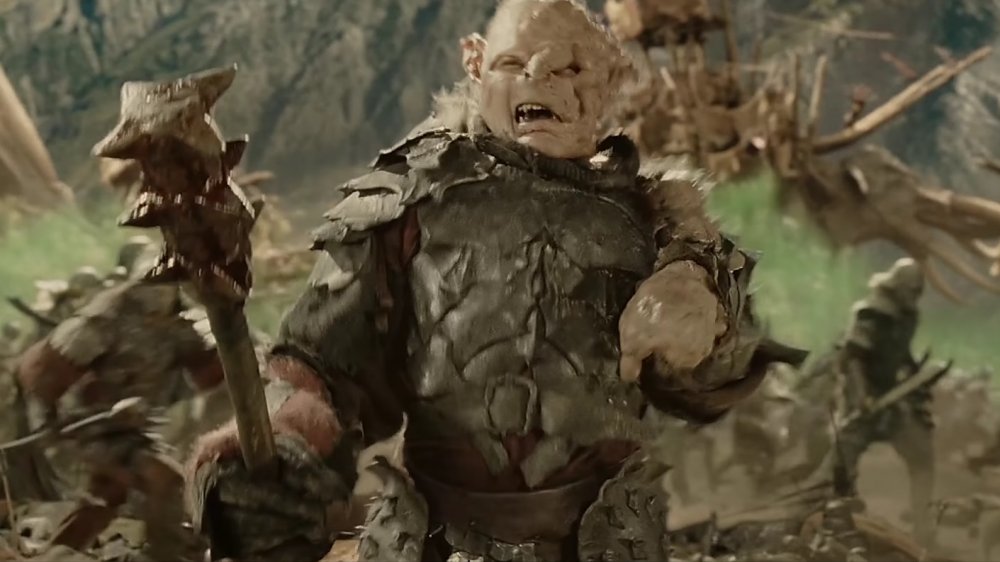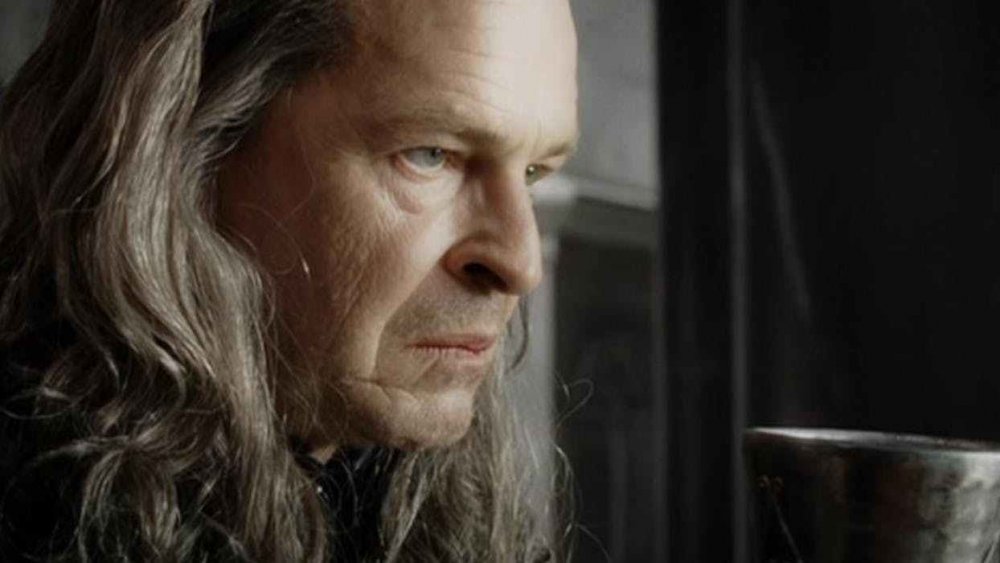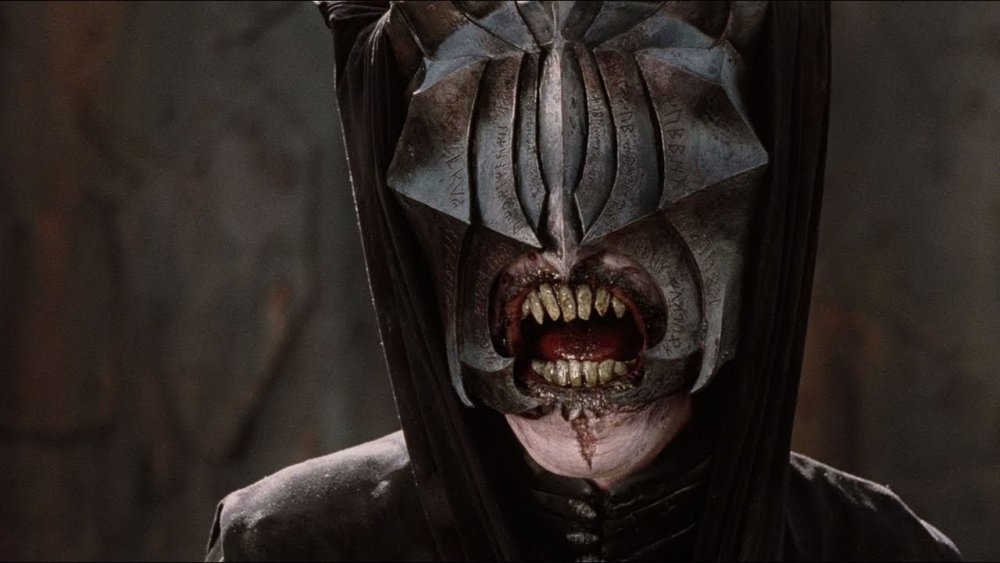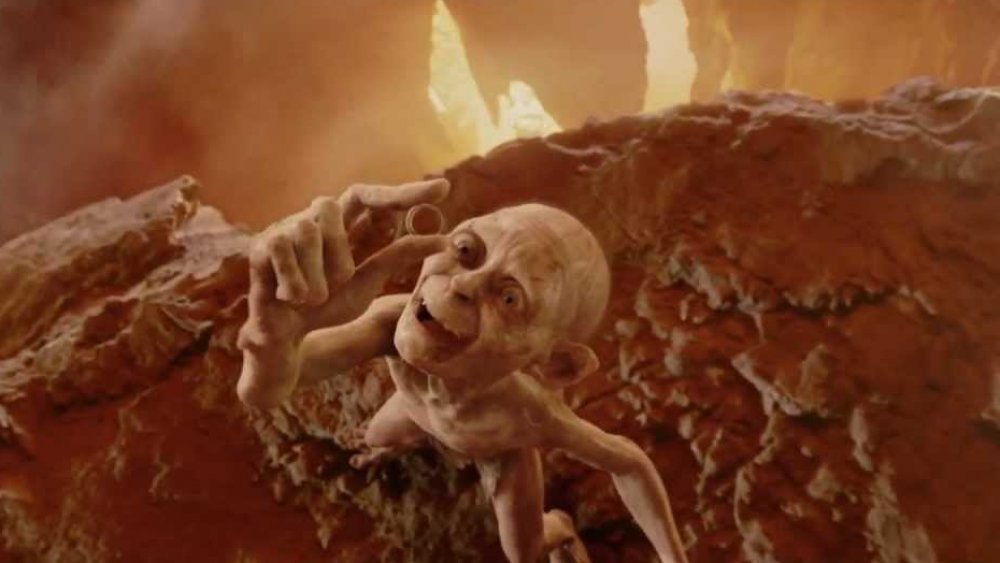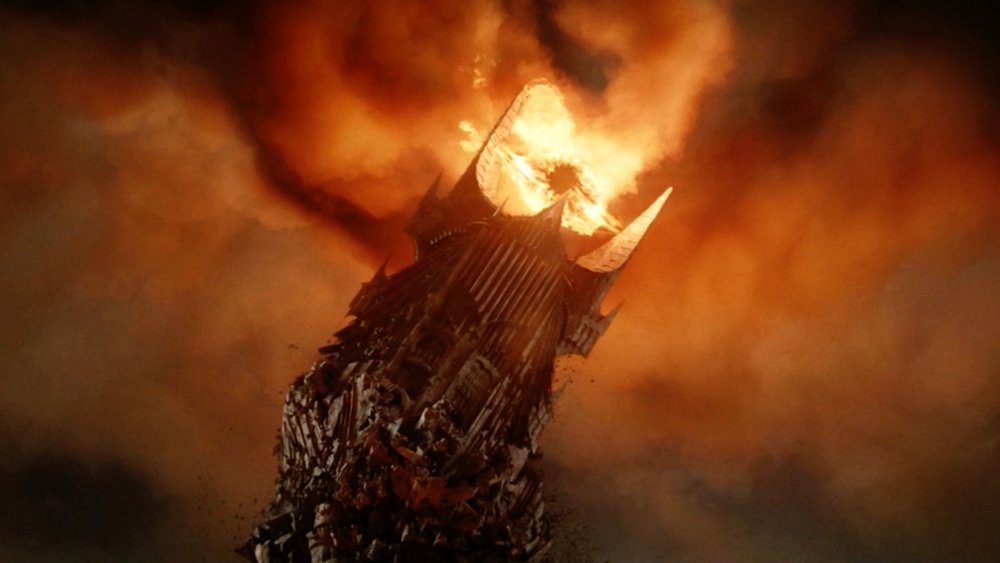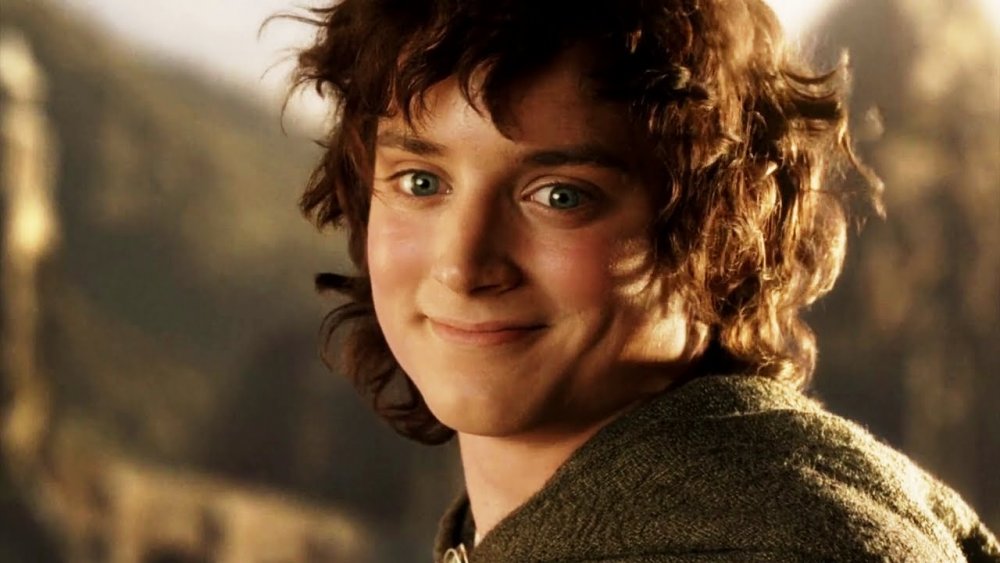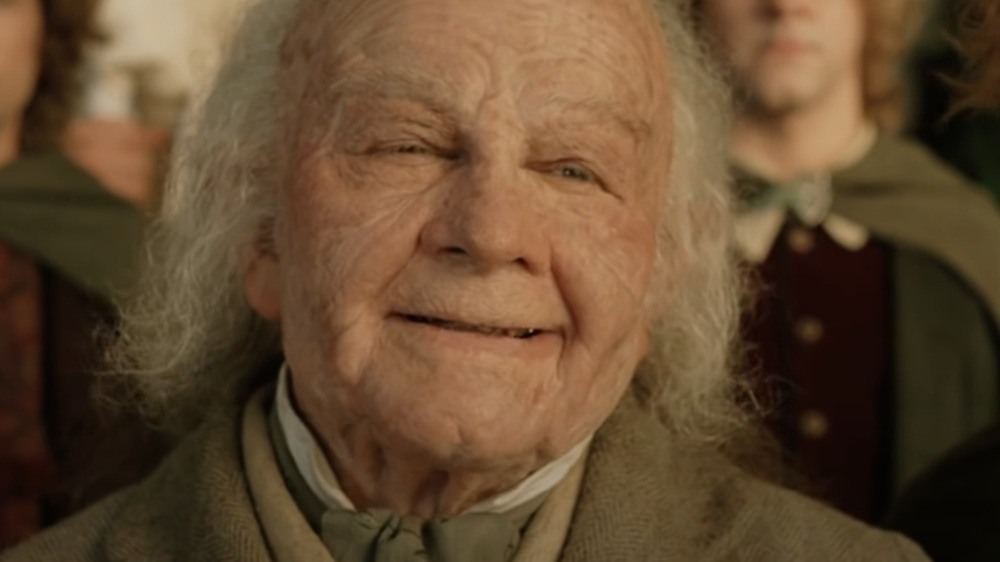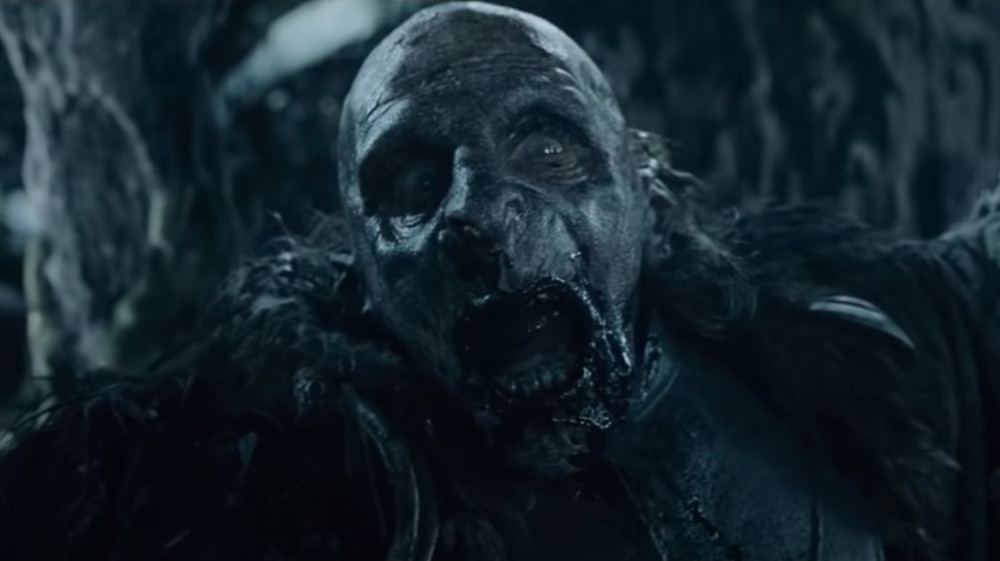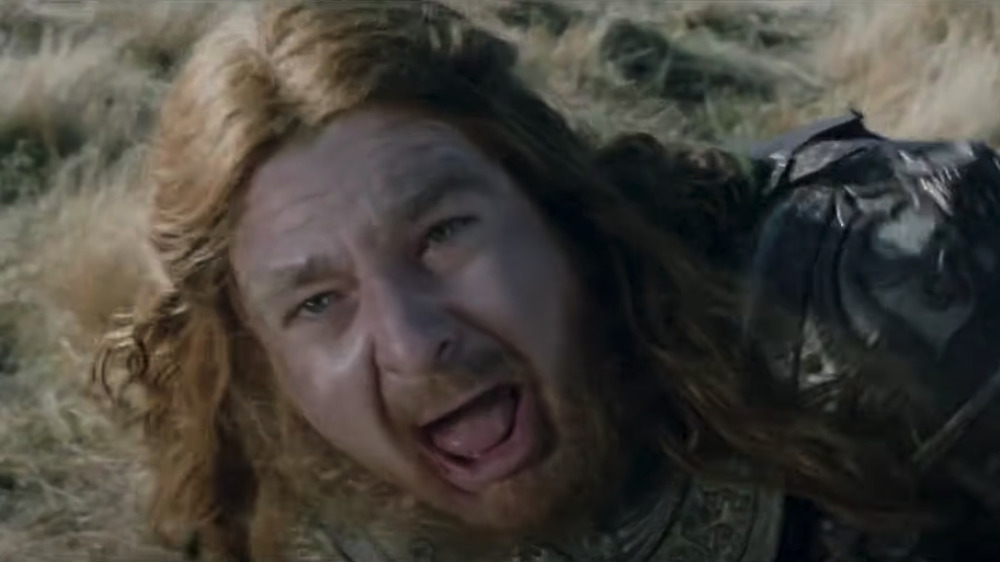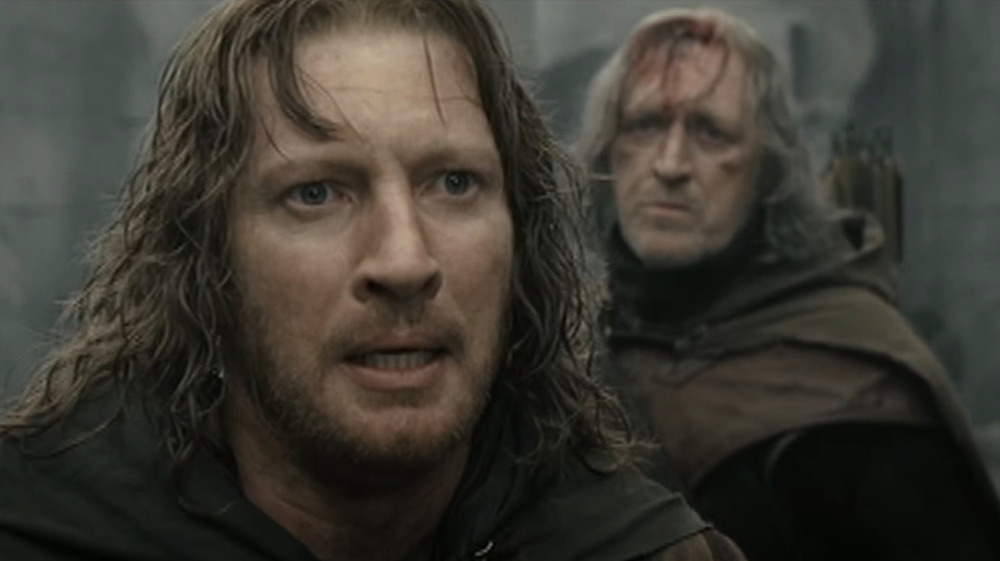The Last Words Of Every Fallen Lord Of The Rings Hero And Villain
J.R.R. Tolkien's epic The Lord of the Rings has captivated readers and viewers alike for generations. While the legendary author may have passed away a half a century ago, his monumental story lives on and only continues to gain steam via movies and TV. And one of the primary ways Tolkien's trilogy has managed to captivate such a large audience is through the emotional rise and fall of its many compelling characters. From Boromir's redemptive exit to Sauron's crumbling catastrophe, The Lord of the Rings trilogy is littered with epic sacrifices, gruesome deaths, and both happy and sad endings.
We wanted to see just how legendary each deceased character's final moments ended up being, based on the litmus test of what they were talking about when they perished. With that in mind, we decided to round up the last words of every fallen Lord of the Rings hero and villain to do some comparing and contrasting.
(Be warned — major spoilers below!)
Let's set up some ground rules
Before we get started, it's important to point out how we're going to go about this. For starters, we've gone ahead and gathered the heroes and villains who die during the story. We've included major heroes from flashbacks, as well as any primary characters who pass on during the story itself.
The other important question to answer before we start is what version of each character's "last words" we're going to go with. After all, it's not like we're working with a single iteration. Obviously, there are Tolkien's original books, but added into the mix are two cinematic adaptations. First, there's the initial, two-part cartoon created in the late '70s and early '80s, and of course, we have Peter Jackson's live-action trilogy.
We've decided to focus on two of these sources. Whenever possible, we'll go with a combination of Peter Jackson's adaptations and the original books. Even then, things will get dicey at points. Many of the fallen characters don't necessarily have concrete "last words" in either version. When this happens, we'll make sure to give a brief rundown of their final moments. After all, actions speak louder than words, right?
Okay, without further ado, here are the last words of every fallen Lord of the Rings hero and villain.
Isildur's last words revolve around the One Ring
Isildur is the hero who cuts the One Ring from Sauron's hand, only to fall to the shiny trinket's hidden power not long afterward. While not a primary character in The Lord of the Rings story, Isildur shows up early in The Fellowship of the Ring film and is referenced throughout the narrative since his actions literally set up the entire "destroy the Ring" scenario. Heck, the Ring is literally referred to as "Isildur's Bane" since owning it leads to his death — which is why we're here.
Isildur dies when he's ambushed by orcs and shot while trying to escape across the Great River. In the film, he doesn't talk but is shown dead, floating in the water. Chronologically, if you back up enough, this would make his last words in the film officially, "No," spoken nefariously as he rejects Elrond's plea for him to throw the One Ring into the fires of Mount Doom.
However, in Tolkien's original writings — particularly in the book Unfinished Tales — the Númenórean king's final line is a bit juicer. Ambushed and about to be killed, Isildur's son, Elendur, tells his father to escape and bring the One Ring to the keepers of the three elven rings before it's recaptured. His father replies, "I knew that I must do so; but I feared the pain. Nor could I go without your leave. Forgive me, and my pride that has brought you to this doom." Epic final words spoken from a soon-to-be-deceased father to his soon-to-be-deceased son.
Elendil and Gil-galad both perish fighting Sauron
We need to take a minute to address Isildur's father, Elendil, along with elven high king Gil-galad. Elendil is the first king of the realms of Gondor and Arnor, which are set up in Middle-earth at the end of the Second Age. And Gil-galad is an elven leader who rules over the bulk of the elves that remain in Middle-earth at that time. Eventually, Sauron picks a fight with them, and the two leaders form the Last Alliance, a massive coalition that gathers everyone around in order to attack Sauron and defeat him on his home turf in Mordor.
The Last Alliance is ultimately victorious but at the expense of both of these high kings. The leaders are killed in combat with Sauron just before Isildur cuts the One Ring from the villain's hand. In fact, Isildur even does so using his father's broken sword. At the council of Elrond, the leader of Rivendell, who was present at their deaths, recalls the scene, saying that, "I beheld the last combat on the slopes of [Mount Doom], where Gil-galad died, and Elendil fell, and Narsil broke beneath him..."
While neither character is officially given final words, they appear in both the books and films, and their bravery and deaths set the stage for Sauron's first defeat at the end of the Second Age.
Déagol's last words are incredibly heartbreaking
Everyone is fascinated by Sméagol, the hobbit-like creature eventually known as Gollum. He's a pitiable wretch whose life is warped out of recognition after he encounters the One Ring. He eventually convinces himself that he got the bauble as a birthday present, but as fans know, the creature hardly receives the Ring in a gift-wrapped box. He steals it from a good friend, and in the process, murders his companion.
The colleague in question? One Déagol, another hobbit-like creature. One day, five centuries before the Lord of the Rings story begins, the pair of friends decide to go on a fishing excursion together, and Déagol is pulled into the water by a monstrous fish. He's dragged to the bottom, where he finds the One Ring. When Sméagol sees the piece of jewelry, he demands that his friend give it to him since it's his birthday. In the opening scene of The Return of the King, the poor fellow responds to Sméagol's unreasonable request with, "Why?" And after that simple question, he winds up dead.
In the book, Déagol starts off with "why," but he follows this up with the final words, "I don't care. I have given you a present already, more than I could afford. I found this, and I'm going to keep it." It's an extra factoid that makes Sméagol's violent reaction that much more cold-blooded.
Gandalf's 'last' words are sad and stirring
Okay, okay. Gandalf doesn't technically die. But he does "fall," so we're including him here. In fact, while his spirit lives on in Gandalf the White, there are some fairly significant implications that after Gandalf the Grey defeats the Balrog, his physical body is more or less reincarnated as Gandalf the White.
That said, Gandalf's contest with the Balrog in Moria leaves us with one of the absolute best lines in all of The Lord of the Rings trilogy. In the books, he shouts, "You cannot pass!" And in the films, he thunders, "You shall not pass!" The line, delivered as the wizard stands on the Bridge of Khazad-dûm, is enough to send shivers down the back. As he falls into the deep abyss, though, Gandalf's official "last words" aren't said in defiance to his enemies. Rather, they're a cheeky command to his friends. As he falls he cries out, "Fly, you fools!"
Identical in both book and movie, the words simultaneously communicate a sense of care and frustration that sends the rest of the Fellowship members scampering out of Moria lickety-split. While he does return later in the story, Gandalf's initial sacrifice is still a powerful moment that earns its place on this list in spades.
The Balrog doesn't technically have last words ... or any words
One of the villains that finds an untimely death earlier in the story is the Balrog. Also known as Durin's Bane, the fiery demon comes across as indestructibly powerful in The Fellowship of the Ring, but early in his story, he's actually a refugee fleeing from the catastrophic War of Wrath. In that war, Sauron's original master, Morgoth, is defeated, and his surviving servants scatter across the continent, looking for places to hide.
The Balrog relocates deep under the thriving dwarven kingdom of Khazad-dûm for nearly 2,000 years. Eventually, though, he's disturbed by the dwarves, at which point he drives them away, and the area becomes known as Moria or the "Black Pit." When the Balrog attacks the Fellowship of the Ring, the quietly overpowered Gandalf ends up being the one who confronts the devil on the Bridge of Khazad-dûm.
The pair of combatants fall deep into the abyss below, where they begin a knock-down, drag-out duel that progresses from far underground all the way up to the top of the mountains above. There, with clouds, fire, and lightning surrounding them, the Balrog is eventually killed by Gandalf, breaking the mountainside as he falls. As with multiple villains in Tolkien's writing, the Balrog doesn't get any last words — or any words at all, for that matter — but its death is a momentous event, both because it means Gandalf is still alive and because it frees up Khazad-dûm for the dwarves to eventually return to their ancient home.
Lurtz always has his eyes on the prize
Most of the main characters in Peter Jackson's films are from Tolkien's original text. Sure, some of them are completely rewritten for the cinematic narrative, but very few are made up out of whole cloth. Lurtz is one of those completely fabricated characters. The uruk-hai captain leads Saruman's forces in pursuit of the Fellowship of the Ring, and the fella provides a nifty mini-villain for the main characters to defeat in the otherwise villain-less finale of The Fellowship of the Ring.
While we get a few minor scenes with Lurtz earlier in the film, he receives the bulk of his screen time in his final moments. First, he turns Boromir into a living pin cushion, shooting the Gondorian hero with multiple arrows. After that, the orc captain gives Aragorn a run for his money in a kick-ass one-on-one duel. Eventually, though, the Ranger wins out, and Lurtz finds his arm and head removed from his body.
The perfect example of a pure plot device, Lurtz doesn't have many lines in the film. During his final moments, he doesn't even say anything at all as he quietly duels multiple members of the Fellowship. However, shortly before his last breath, the uruk-hai can be heard shouting to his own men, "Find the halflings. Find the halflings!" A workaholic to the bitter end, Lurtz can't take his mind off of his mission, even in his last hour.
Boromir's final moments will make you tear up
Boromir has one of the best character arcs of any hero in The Lord of the Rings. Heir to the steward of Gondor, he joins the Fellowship of the Ring only to fall to the lure of the One Ring. After attempting to steal it from Frodo, he repents and sacrifices his life by defending Merry and Pippin. Aragorn finds him moments before he takes his final breath, and Boromir is able to fill him in on the fact that he tried to take the Ring and what happened to Merry and Pippin. He also urges Aragorn to go to help his people. The emotional shared moment cuts to the quick, regardless of whether you're watching or reading the event.
In the movies, Boromir's last words are heart-rending, as he says, "I would have followed you, my brother, my captain, my king." The confession that he'd finally accepted Aragorn not as a challenger to power but as his returned king is the perfect way to resolve his previous scorn for the Ranger at the Council of Elrond.
In the books, his final line reads, "Farewell, Aragorn! Go to Minas Tirith and save my people! I have failed." To which Aragorn replies, "No! You have conquered. Few have gained such a victory. Be at peace! Minas Tirith shall not fall!" The response causes Boromir to smile before he breathes his last.
Haldir makes the most out of his Lord of the Rings role
Haldir of Lothlorien falls under the awkward category of minor book character who was turned into an overly involved movie hero. In the original source material, Haldir helps the Fellowship out as they travel through Lothlorien. He talks quite a bit and even shows up after the whole Mirror of Galadriel incident to help send the travelers on their way down the Great River. After that, we don't meet him again. Period.
In the movies, though, Peter Jackson apparently decided that the Lothlorien guide was important enough that he needed to play a recurring role — in the film's climactic battle, no less. As the men of Rohan prepare to fend off Saruman's hordes, Haldir unexpectedly shows up with a bunch of high-quality archers. In the ensuing battle, Haldir meets an untimely death, and the plot moves on without him all the same.
Just before Haldir's death, he shouts something inaudible to his retreating men. However, since that's hardly worthy of "last words" sentiment, we thought it'd be better to highlight his previously spoken words when he arrives at Helm's Deep. Facing King Théoden, he says, "I bring word from Elrond of Rivendell. 'An alliance once existed between elves and men. Long ago, we fought and died together. We come to honor that allegiance.'" He follows this up with the perfect one-liner, "We are proud to fight alongside men once more." There. That's more like it.
Saruman should be nicer to Wormtongue
Saruman serves as one of the primary antagonists in The Lord of the Rings story. Originally sent to resist Sauron, the White Wizard eventually becomes corrupted and vies for power himself. This leads to his overthrow in The Two Towers and his eventual death at the hands of Gríma Wormtongue (two different ways, no less) in The Return of the King.
In the extended film version, Saruman's death comes as he stands on top of the Tower of Orthanc in the midst of the drowned, ent-trampled ring of Isengard. He's arguing with a group of heroes who've come to talk with him, and as the scene develops, Wormtongue attacks him from behind, stabs him, and sends him careening off the edge of the tower. Just before he's killed, Saruman can be heard saying the last words, "You withdraw your guard, and I will tell you where your doom will be decided. I will not be held prisoner here."
In the books, Saruman survives until the end of The Return of the King, at which point it's discovered that he's been masquerading as the troublemaker "Sharkey" as he orchestrates the systematic destruction of the Shire. Defeated at last by Frodo and his hobbit friends, he orders a broken Wormtongue to follow him, saying, "You do what Sharkey says, always, don't you, Worm? Well, now he says, follow!" Just then, Wormtongue snaps, jumps on his master, and slits his throat.
Gríma Wormtongue goes out with a wimper
Gríma Wormtongue is a sad character. He kicks things off by secretly betraying his king, Théoden, and switching allegiances to the powerful Saruman. This move backfires pretty quickly when Gandalf arrives on the scene, prompting Wormtongue to flee to the White Wizard's domain at Isengard. There, he serves faithfully yet miserably by his new master's side.
In the films, he finds his ending early in the extended version of The Return of the King. After stabbing Saruman to death in a fit of rage, the tortuous creature is felled by a swift arrow fired by Legolas. His last word, uttered moments before, is simply, "No," delivered in response to Saruman's statement that he will never be free.
In the book The Return of the King, a fed-up Gríma backstabs Saruman again, this time in the Shire. His master had been laying waste to the hobbits' homeland for months beforehand, until Frodo, Sam, Merry, and Pippin, with an army of hobbits at their heels, finally defeat him as the story wraps up. Just before he slits Saruman's throat and is shot by arrows as a result, the warped and exhausted Wormtongue is accused by his wicked master of murdering Frodo's cousin, to which he violently hisses, "You told me to; you made me do it." Those are the hateful last words of a completely broken character.
Théoden's last words all involve Éowyn
Théoden is already quite old when Gandalf frees him from the spells of his counselor, Gríma. From there, the king of Rohan personally leads his armies to Helm's Deep, where they win an epic victory by the skin of their teeth. Then, they gather more troops and head to Minas Tirith, where the aged ruler dies in a glorious charge that kicks off the Battle of the Pelennor Fields.
It's none other than the Witch-king himself who kills Théoden in battle. In the movies, his airborne beast lands on the king, whipping him around, horse and all, and sending man and animal flying to their deaths. In the books, it's specifically explained that "a black dart had pierced [his horse]. The king fell beneath him."
After Éowyn and Merry defeat the Black Rider together, we get two different sets of final words. In the film The Return of the King, Théoden says goodbye to Éowyn in person, saying, "I go to my fathers in whose mighty company I shall not now feel ashamed." He then whispers his daughter's name, dying with his final statement unsaid. In the book, Théoden doesn't realize that Éowyn is nearby. His final words are spoken to her brother, Éomer, "Hail, king of the Mark! Ride now to victory! Bid Éowyn farewell!" As Aragorn later states of the king, "He was a gentle heart and a great king ... and he rose out of the shadows to a last fair morning."
The Witch-king gets way too cocky for his own good
The Witch-king is a recurring villain throughout the trilogy. He leads the nine Ringwraiths on their deadly hunt for the Ring, stabs Frodo at Weathertop, and leads the massive army that attacks Minas Tirith ... and that's just his activity during the War of the Ring. The dude has a rap sheet that stretches way back before that, including sparking multiple wars and raising all sorts of hell for men, elves, and dwarves throughout the Second and Third Ages.
However, he finally meets his match during the Battle of the Pelennor Fields. Doubly overconfident from millennia of success and a prophecy that no living man can kill him, he recklessly gets involved in the fighting, murders King Théoden, and then runs into Éowyn and Merry, who kill him in single combat. In the movie, his last words to Éowyn before Merry surprises him are, "Fool. No man can kill me. Die now." In the books, his slightly different last words are, "Hinder me? Thou fool. No living man may hinder me!" Epic either way, the entire ending of the Witch-king is one of the highlights of the entire saga.
Gothmog is a guy who loves giving commands
We've come, once again, to a character who was dramatically over-dramatized for the films. Gothmog is second-in-command during the siege of Minas Tirith. He's briefly mentioned in the books and doesn't have an official "ending" in the source material. However, Peter Jackson decided to turn him into a funky-faced orc who's high on his own authority and convinced that the age of the orc is about to begin — which, what?
Anyway, his involvement in the films does make him a big enough character to deserve a spot on the list. In The Return of the King, we see him ordering his soldiers around, dodging boulders shot by catapults and finally preparing for the sideswiping charge of the Rohirrim as dawn breaks and hope shines again. Later in the battle, the nasty dude can be seen crawling towards the wounded Éowyn. With his weapon lifted to kill, Aragorn and Gimli arrive in the nick of time and finish him off. In order to nab his last word, you need to back up to just before the Riders of Rohan come crashing into the side of his army. Organizing his soldiery and prepping them for the incoming tidal wave, he shouts, "Fire!" It's a command that becomes his last on-screen utterance.
Denethor leaves The Lord of the Rings with some fiery last words
The steward of Gondor is an interesting character and one who's difficult to categorize as hero or villain. He leads Gondor and (in the books, at least) does a decent job prepping for the inevitable onslaught from Mordor. Eventually, though, the steward breaks down under the pressure — not to mention the fear of the incoming king who he doesn't want to hand power to — and tries to kill himself and his son, Faramir. So, yeah, he's pretty bad when all's said and done.
In the movies, Denethor's final words, uttered as Gandalf and Pippin arrive to save the day, are, "No! You will not take my son from me!" As he loses control of the situation (and begins burning alive on his own pyre), he gazes on his son and quietly says, "Faramir," before running to his doom.
In the books, Denethor's last line is directed at Gandalf as he resigns himself to a suicidal end, declaring, "But in this at least thou shalt not defy my will: to rule my own end." After this, he calls to his servants, "Come hither! Come, if you are not all recreant!" Snatching a torch, he sets the pyre on fire and purposefully lies down to die. As he lies there, he gives one great cry and then perishes amidst the flames.
The Mouth of Sauron might've miscalculated a bit
Fans of the Lord of the Rings films must watch the extended editions if they want to get familiar with the character known as the Mouth of Sauron. The renegade is a powerful official in the Dark Lord's bureaucracy, and he comes out to haggle with the captains of the West when they arrive at the gates of Mordor at the end of The Return of the King. In the books, we don't hear the last words of this manipulating administrator. However, he doubtless dies or goes into hiding after Sauron's fall.
In the film, though, he's proactively beheaded by Aragorn (the second villain to be decapitated by him on this list, we might add) in a questionable act of diplomacy. His last, admittedly provocative words before he's unceremoniously executed are, "And who is this? Isildur's heir? It takes more to make a king than a broken elven blade." Foolish words to speak to a hero who makes a habit of removing his enemies' heads from their bodies on a regular basis.
Gollum's last words are precious
Gollum's last words, or more accurately, last word, is arguably, the most famous line from the entire Lord of the Rings trilogy — at least as far as readers of the books are concerned. The antihero inadvertently saves the day by attacking Frodo Baggins just as he arrives at Mount Doom and chooses to claim the Ring rather than destroy it. Biting off Frodo's ring finger, Gollum reclaims the overpowered piece of jewelry just in time to slip off the edge and fall to a fiery death.
In the film The Return of the King, his final words are a progression of "yes" and "precious." These are repeated over and over again in ecstatic joy as he dances in the background before Frodo tackles him off the cliff, and he dies. In the book, Gollum specifically cries out, "Precious, precious, precious! My Precious! O, my Precious!" Then, all on his own and without any help from Frodo, Gollum steps backward just a tad too far and slips to his death. His true "last word" comes out of the depths as he wails "precious" one last time.
Sauron's fall is an epic conclusion to The Lord of the Rings
Sauron is the antagonist of The Lord of the Rings. Heck, the entire series is named after him. While he doesn't technically "die," nor does he have any last words, he has to be included here if only because he's the one, more than any other character, who truly falls. Whether you're talking about Peter Jackson's eyesore (pun intended) falling from a crumbling tower or the more spiritual implication of his defeat in the books, either way, Sauron truly falls low by the end of the story.
How low? In The Return of the King, Gandalf explains what will happen to Sauron after the Ring is destroyed, saying that, "If [the Ring] is destroyed, then [Sauron] will fall; and his fall will be so low that none can foresee his arising ever again," adding that, "He will lose the best part of the strength that was native to him in his beginning, and all that was made or begun with that power will crumble, and he will be maimed forever, becoming a mere spirit of malice that gnaws itself in the shadows, but cannot again grow or take shape." While he may not be dead or have formal last words, there's no doubt that Sauron's fall is one of the most memorably cataclysmic events in all of modern fantasy.
We've got to give Frodo a special mention
Finally, we have a special mention from a hero that, while not technically dead, deserves to be on a list of last words from fallen heroes. We're talking about Frodo. Sure, the Ringbearer sails away into blissful retirement at the end of The Return of the King. The truth is, though, he does so because he's so spiritually devastated by the ordeal of carrying the Ring that he's basically washed up and can't endure life in Middle-earth anymore.
His last words in the movie, delivered as slow as molasses, are, "I set out to save the Shire, Sam, and it has been saved but not for me." Then, as he gives Sam the book he's written about their adventures, he adds, "The last pages are for you, Sam." In the book version, after explaining why they're headed to the Grey Havens, why he must leave, and that Sam is his heir and must stay behind with his family, Frodo finishes with an invitation for his best friend and gardening companion to come and see him off at the harbor, saying, "Come now, ride with me!"
Bilbo gets fired up for some fresh adventures
The Lord of the Rings may not be Bilbo Baggins' story, but the entire adventure wouldn't have taken place if it weren't for his pre-adventure half a century and more beforehand. By the time of Lord of the Rings, Bilbo is a very old Hobbit that is waning quickly without the power of the One Ring to keep him from aging.
The Hobbit hero leaves his comfy retirement pad in Rivendell at the end of The Return of the King. He's feeling very old at this point, but he rallies his strength to head overseas to the immortal Blessed Realm — an honor he's earned due to his career as one of the Ring-bearers.
In the Return of the King book, Bilbo's last line comes when he meets Frodo and Sam on their way to the Grey Havens. The old Hobbit exclaims, "Hullo, Frodo! Well, I have passed the Old Took today!... So that's settled." Competitive to the end, this line is in reference to Bilbo officially living long enough (with the help of the One Ring, of course) to become the oldest Hobbit of all time. His last line immediately follows this rivalrous statement as he tells his cousin, "And now, I think I am quite ready to go on another journey. Are you coming?"
In the movie adaptation, the line doesn't come until they actually reach the havens, at which point we get the truncated version "I think I'm quite ready for another adventure."
Grishnákh experiences the wroth of Fangorn
Grishnákh is an orc captain that shows up for a brief stint in The Two Towers when Merry and Pippin are being orc-dragged across Rohan. In the book, he plays a very important role as the chief of the soldiers present who serve the Dark Lord. He resists the Uruk-hai captain Uglúk, who wants to speed the prisoners to Saruman in Isengard rather than Sauron in Mordor.
In Tolkien's original iteration, the orc captain tries to spirit away the Hobbits from Uglúk's soldiers so he can have the One Ring for himself. In this process, we hear his last words, which run, "Untie your legs? I'll untie every string in your bodies. Do you think I can't search you to the bones? Search you! I'll cut you both to quivering shreds. I don't need the help of your legs to get you away — and have you all to myself!" After this, he tries to escape with both Hobbits, but he's ridden down and skewered by a Rider of Rohan, bringing his chapter-long role to a sudden end.
In Peter Jackson's adaptation, the villain's fate is even worse. He survives the Rohirrim raid and chases the Hobbits into the eves of Fangorn. Limping and already bloodied from wounds, he yanks Merry out of a tree and says "Let's put a maggot hole in your belly" before Treebeard wakes up behind him and stomps him out of existence.
Háma dies in multiple battles
Háma is the doorward of Edoras. In other words, he guards Théoden's house. Fortunately, he isn't the greatest at his job, as he plays the critical role of letting Gandalf into the hall with his staff in hand, inadvertently allowing the wizard to free Théoden from Wormtongue's bewitchment. Truth be told, though, Háma is a good egg. Apart from his slip with the White Wizard, he plays the part of the faithful soldier to the hilt.
In the books, he releases Éomer from prison, arrests Wormtongue, and brings the King of the Golden Hall his sword. From there, Háma follows his lord to the Battle of Helm's Deep, where he tragically dies in the fighting. His last words before the battle starts come in conversation with a fellow soldier regarding Théoden's deposed advisor Gríma and his new, temporarily absent counselor Gandalf. When the fellow says that Gandalf's eccentric behavior could be explained by Wormtongue, Háma's response is "True enough, but for myself, I will wait until I see Gandalf again."
In the movie version, Háma doesn't make it as far as the battle. The Captain of the King's Guard is killed en route to Helm's Deep. His last words come when he's busy scouting ahead of the Rohirrim column. As he suspiciously combs the terrain for enemies, an accompanying soldier asks, "What is it? Háma?" He replies "I'm not sure," and a few seconds later he's knocked over by a Warg-riding orc whose mount closes in, eating the loyal warrior face first.
Madril becomes Gothmog's first personal victim
Madril is a character that was purely invented for the Peter Jackson film adaptations. However, it's interesting to note that the character's name closely mirrors one from Tolkien's books — Mardil, who happens to be a Steward of Gondor a thousand years before the Lord of the Rings story takes place. This makes him one of Faramir's ancient ancestors, which is appropriate, since Madril serves as the reluctant hero's right-hand man.
In The Two Towers, the Gondorian officer witnesses the events in Ithilien, where Faramir's forces ambush the Haradrim and then take Frodo, Sam, and eventually Gollum prisoner. After that, Madril heads back with the troop of rangers when they return to Osgiliath. In The Return of the King, he can be seen helping Faramir prepare the hopeless defense of the same ruined city. When the invading forces, led by the disfigured Gothmog, swarm across the river like beetles, they overrun the garrison with little effort.
Amongst the Gondorian casualties is Madril, whose last onscreen words are as a faithful second in command. After shouting "Faramir!" and saving his captain from his Orc pursuers, he advises his lord, "We can't hold them. The city is lost." Not long afterward, the old soldier is knocked down by his enemies and receives a cold-blooded spear to the heart from Gothmog as he helplessly lays in his enemy's path.
